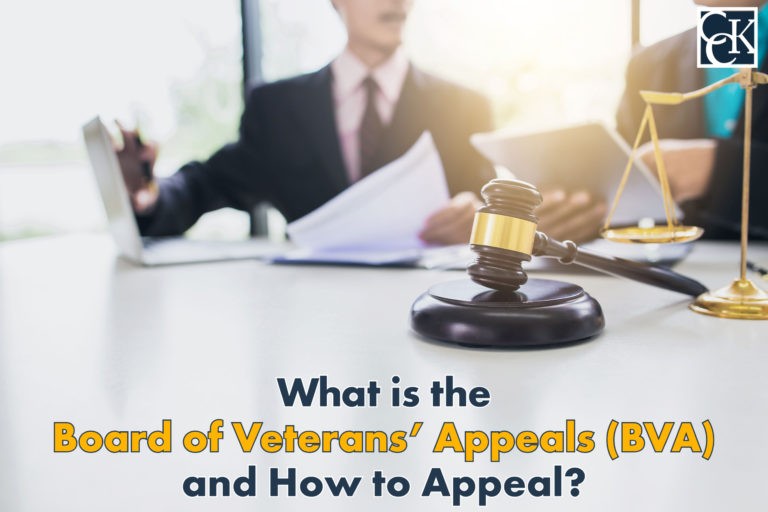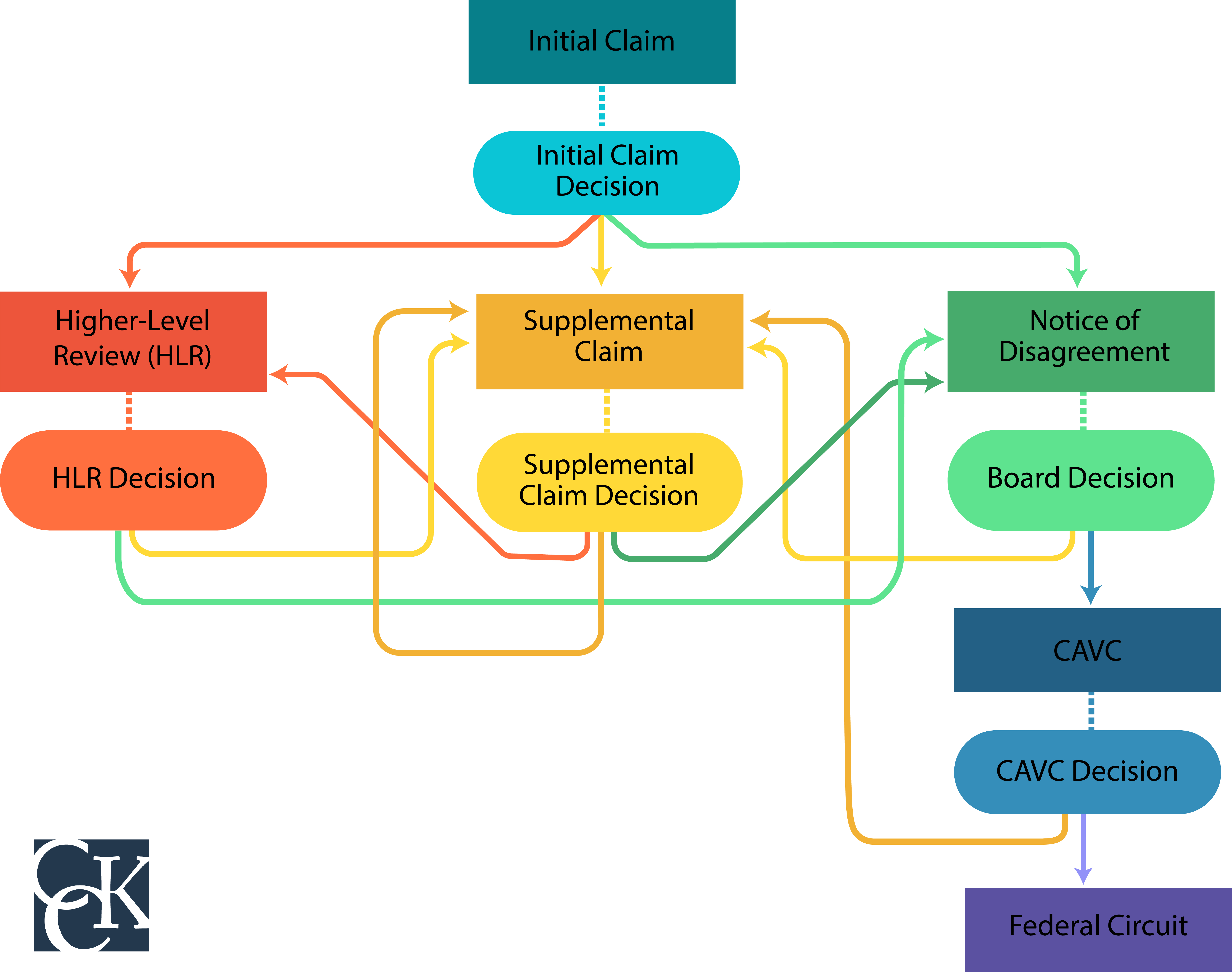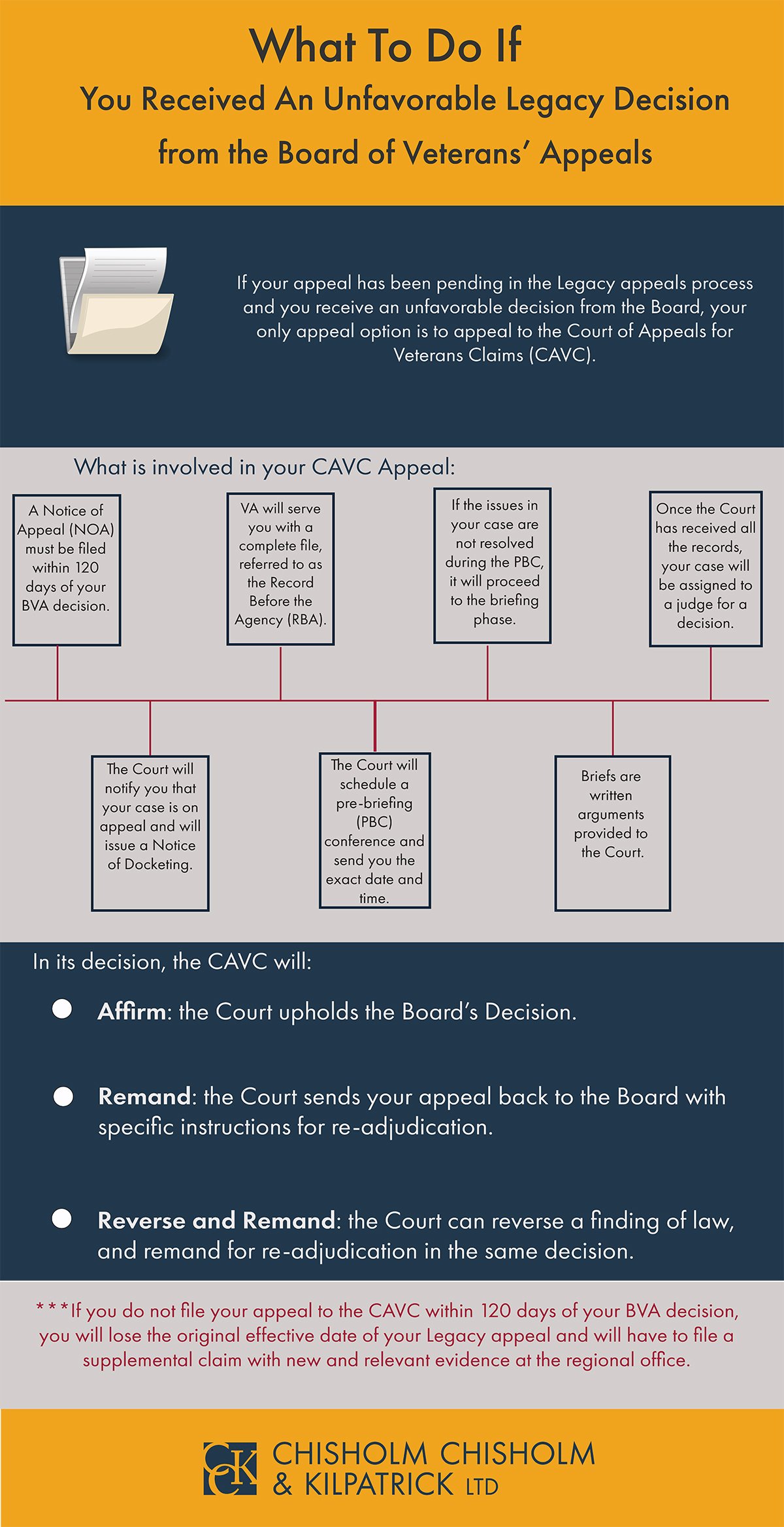What is the Board of Veterans’ Appeals (BVA) and How to Appeal?

CCK Law: Our Vital Role in Veterans Law
The Board of Veterans’ Appeals (BVA) is the appellate body of the United States Department of Veterans Affairs (VA), meaning it has the ability to overrule a decision made by a VA regional office.
When you appeal a decision to the BVA, it reviews your case de novo. This means the Board gives your claim and the evidence you submit a fresh look. The Board of Veterans’ Appeals has jurisdiction over all matters pertaining to benefits administered by VA and individuals receiving or applying for them.
An Overview of AMA VA Disability Appeals
In order to understand how appeals to the Board work, it can be helpful to understand how the AMA system, or Appeals Modernization Act, works. In February 2019, VA officially implemented the AMA system. In this new appeals system, veterans have three lanes for appealing a decision from VA:
- Supplemental Claim Lane—This option is used to submit new and relevant evidence.
- Higher Level Review—In this lane, the claim will be reviewed by a senior VA claims adjudicator and no new evidence is submitted.
- Notice of Disagreement Lane—This lane allows the veteran to appeal directly to the Board of Veterans’ Appeals.
Within the Notice of Disagreement Lane, there are three dockets from which the veteran must choose one. These dockets include the evidence docket, the direct review docket, and the hearing docket.
Evidence Docket at the Board of Veterans Appeals (BVA)
The evidence docket is for claimants who want to submit additional evidence, but do not want a Board Hearing. In this docket, claimants can submit additional evidence to the Board with a Notice of Disagreement (NOD) and within 90 days following the submission of the NOD.
VA will include in the record any evidence submitted by the claimant in support of a pending appeal and any issue, contention, or argument a claimant may offer. Evidence can include medical evidence, lay evidence, service records, and more.
In this docket, the Board issues its decision based on the following:
- The evidence of record at the time the AOJ decision on the issue(s) on appeal; and
- The evidence submitted by the claimant or the claimant’s representative within the 90-day window/with your submission
In its decision, the Board will include a summary of the evidence considered as well as an explanation of how to obtain or access the evidence used in making the decision.
The evidence docket may be a good choice if you have additional evidence you want to submit to strengthen your appeal, but do not want to have a hearing at the Board. This is because the direct docket does not allow new evidence to be submitted and the hearing docket, while it does allow new evidence, also involves a hearing. A hearing could mean longer wait times for the claimant to receive a decision. The Board states that appeals in the evidence docket could take longer than 365 days.
Direct Review Docket at the Board of Veterans Appeals (BVA)
The direct review docket, or direct docket, at the Board of Veterans’ Appeals applies to veterans who do not want to submit additional evidence to the Board, and do not want a hearing before a Veterans Law Judge.
In this docket, the Board’s decision will be based on a review of the evidence of record at the time of the agency of original jurisdiction’s decision (usually the Regional Office) regarding the issue(s) on appeal. In other words, the Board will only look at the evidence that was in the claimant’s file when the decision on appeal was issued.
VA has set a 365-day goal for issuing decisions in the direct review docket. This goal, however, can be impacted by the number of cases received. Each case has a target distribution date. The target distribution date considers both the date by which the case must be decided in order to meet the timeliness goal, meaning 365 days from the Notice of Disagreement, and the average amount of time it takes to issue a decision from the date the case is assigned to a Veterans Law Judge.
CCK’s BVA Backlog tracker provides some insight as to recent wait times veterans have experienced.
The Direct Review Docket is typically the fastest of the three dockets since it does not involve the submission of new evidence or a hearing. Additionally, this option allows for more choice for veterans to go to the Board and means veterans with fully developed claims can eliminate additional wait time at the Board.
Hearing Docket at the Board of Veterans Appeals (BVA)
The hearing docket is for claimants who want to have a hearing before a Veterans Law Judge. Claimants are entitled to a hearing on any issue involved in an appeal. Board hearings allow you to present your story and case for benefits to the Veterans Law Judge directly.
Claimants can request a Board hearing when submitting their Notice of Disagreement. In doing so, claimants must elect the hearing docket option.
Options for Hearings:
- Central Office Hearing—Hearings at the Board’s HQ in Washington, D.C.
- Regional Office Hearing—Hearings at your local regional office with a judge via virtual link.
- Virtual Tele-Hearing—Hearings from any location with internet/device capability.
- Travel Board Hearing (Legacy Only)—Judge presides over the hearing at local RO in person.
The Board must notify claimants, or representatives of claimants, of the scheduled time and location of the hearing at least 30 days prior to the hearing date. Requests to change a board hearing date may be made at any time up to two weeks prior to the scheduled date with good cause. Following the hearing, the Board must provide a copy of the hearing transcript if requested.
Hearings allow veterans an in-person opportunity to submit any available evidence which they consider relevant and any arguments, witnesses, or contentions that they may consider pertinent to their claim.
The Board will consider the following evidence in its decision:
- The evidence of record at the time of the agency of original jurisdiction (AOJ) decision on the issue or issues on appeal;
- The evidence submitted by the claimant and/or representative at the hearing, to include testimony at the hearing; and
- The evidence submitted by the claimant and/or representative within 90 days following the hearing
However, the Board will not consider evidence submitted by the claimant after the initial rating decision but before the hearing.
There can be many benefits to Board hearings, however the long wait times veterans often experience can overshadow potential benefits.

Can I Switch Board Dockets?
A claimant may request to switch to a different docket. The Board will move your appeal to the appropriate docket, but will retain your original docket.
However, you cannot make this request if evidence has already been submitted or a hearing has been held. A request to switch dockets must be filed within one year and it must be filed with a new Notice of Disagreement.
Who makes up the Board of Veterans’ Appeals?
The Board of Veterans’ Appeals has a Chairman, a Vice-Chairman, and a group of Veterans Law Judges who are also known as “Members of the Board.” The Board specifies no set number of judges. The count of judges can vary based on appeals volume at any given time.
The Board’s judges have a large administrative staff that consists of attorneys and other personnel. Staff members assist the judges with paperwork and reviewing claims. The Chairman presents a report at the end of each fiscal year that summarizes Board activity and projects appeals volume and staff needs for the upcoming fiscal year.
What does the Board of Veterans’ Appeals do?
The vast majority of the Board of Veterans’ Appeals work — over 98 percent — involves reviewing VA disability appeals. When the regional office renders a decision on a disability claim with which the applicant disagrees, the applicant has the option to appeal the claim to the BVA. The Board of Veterans’ Appeals then takes a new look at the claim and supporting evidence and issues a final decision. The Board of Veterans’ Appeals is not bound by the decision made at the regional level.
The Board also handles appeals on other types of VA benefits. These include home loans, insurance, health care, education, and insurance benefits. Anytime an applicant for VA benefits disagrees with a decision made by the office that has original jurisdiction (in the case of disability benefits, the VA regional office), the applicant can appeal to the Board of Veterans’ Appeals.
Who makes decisions on behalf of the Board of Veterans’ Appeals?
Only Veterans Law Judges have the authority to make decisions on behalf of the Board of Veterans’ Appeals. They are the ones who issue final decisions on appeals.
The BVA’s support staff, including attorneys and administrative personnel, assist the judges in reviewing appeals. They help establish the facts and determine if the evidence corroborates the claims made by the applicant.
Does a Board of Veterans’ Appeals review require a hearing?
When you appeal a decision to the BVA, you have the option to request an in-person or videoconference hearing in front of a Veterans Law Judge. However, a hearing is not a requirement to have your case decided by the Board.
A hearing can strengthen your appeal, especially if you have a VA attorney who can present a compelling case on your behalf. The attorneys at Chisholm Chisholm & Kilpatrick LTD have years of experience conducting BVA hearings on behalf of our clients. We can build a convincing case for you and present it to the Board.
Can I appeal a Board of Veterans’ Appeals decision?
Yes. Veterans can appeal a BVA decision by going to the Court of Appeals for Veterans Claims (CAVC) or by filing a supplemental claim with new and relevant evidence.
Other options are as follows:
- Appeal to the Board to reconsider its decision.
- Appeal to the Board to vacate its decision and then start the process anew.
- Appeal to the Board to revise its decision based on a clear and unmistakable error.
Most times we will recommend appealing the Board denial to the Court of Appeals for Veterans Claims. A VA attorney can examine your claim and determine the best way to proceed. At Chisholm Chisholm & Kilpatrick LTD, we have years of experience fighting the VA on behalf of our clients and will pursue your case aggressively.
Call today for a consultation: 800-544-9144
Share this Post


